8+ SAMPLE Music Business Proposal
-
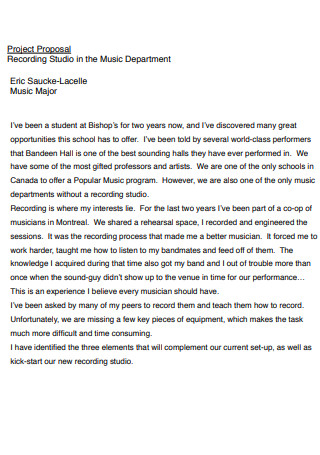
Music Business Studio Proposal
download now -
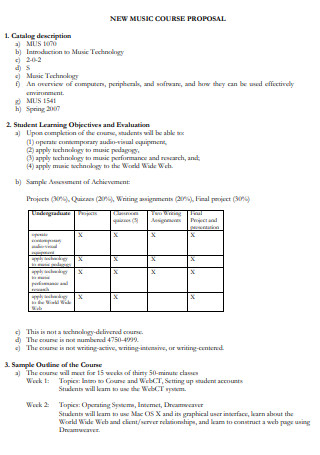
Music Business Proposal
download now -
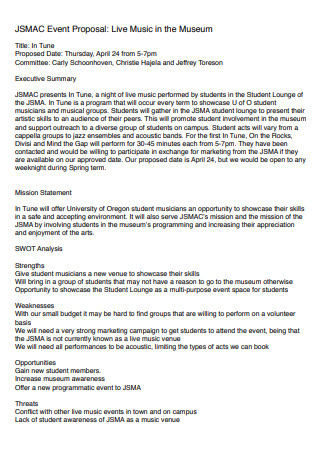
Music Event Business Proposal
download now -
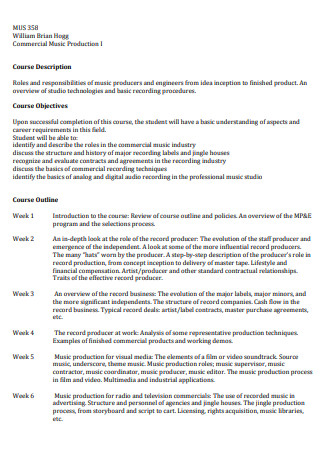
Music Production Business Proposal
download now -
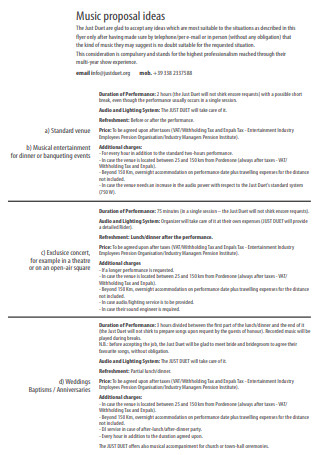
Sample Music Business Proposal
download now -
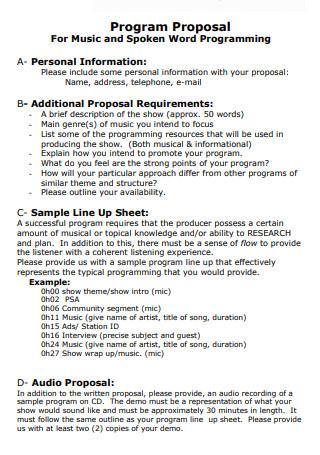
Music Business Proposal Example
download now -
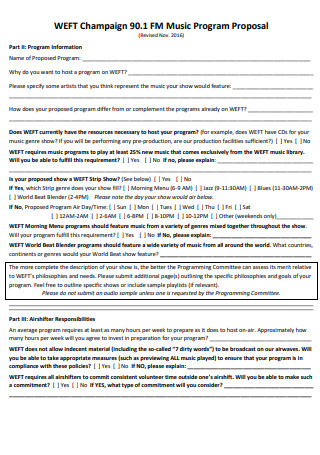
Music Program Business Proposal
download now -
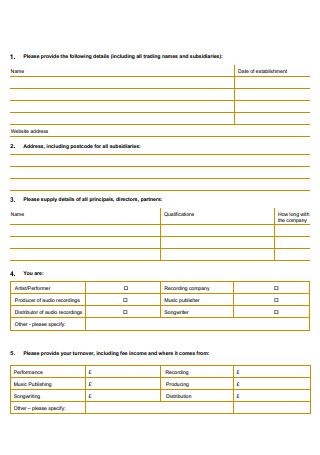
Music Business Proposal Form
download now -
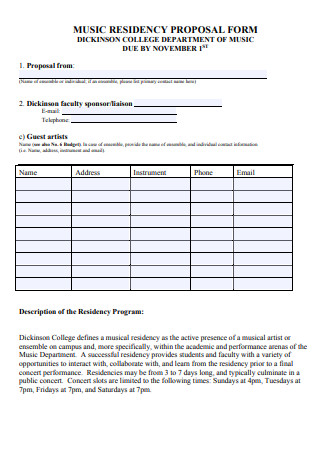
Music Residency Business Proposal Form
download now
FREE Music Business Proposal s to Download
8+ SAMPLE Music Business Proposal
What Is a Music Business Proposal?
How to Write a Music Business Proposal
Essentials for a Successful Music Career
FAQs
What is the aim of a proposal for a business project?
Why use a business project proposal?
Can music be a business?
What Is a Music Business Proposal?
A music Business Proposal is a written document that explains what music sells and how it may be sold to investors or record companies. It might also be a business proposition for a talented client with whom the record label or marketing agency would like to collaborate to create commercially successful songs. The business proposal informs the reader of the present state of the music market and may suggest new music-related innovations. If you are curious how a proposal looks like and how is it formatted, you can check out an example of a music business proposal that we prepared within this article.
How to Write a Music Business Proposal
Now that a music business proposal has been defined and we showed you various music business proposal samples, it is time for you to get into the guide in writing your proposal. Perhaps the tides can turn and a company may create their business proposal for music artist in order to draw in artists to work with them. But since the chances are slim, you would need to act on your own interests. Writing a music business proposal of your own is an effective way to showcase your dedication to kickstarting your music business. Keep on reading to know the steps in writing your Business Partnership Proposal.
Step 1: Overview
This can be as little as a few words long, as long as it sufficiently defines who you are as an artist, a musical entrepreneur, or an aspiring music company owning a record studio and what you are attempting to achieve with it. While this may appear to be an easy task, give it some thought before attempting to create your statement. Everything that follows will be dependent on it. Your plan’s executive summary is a one-page overview. It should begin with an introduction and finish with a description of your activities. Details regarding the financing you already have and what you will need, as well as a summary of your intentions for putting it all together, are also crucial.
Step 2: Market Analysis
You will examine the current music industry in this section, with a particular focus on your musical genre. Opportunities, rivals, trends, market size, and growth potential should all be considered. This is where you will show that you know who your target audience is. Consider what characteristics the individuals who follow you share if you’re currently performing, teaching, or creating on the side. If you are just getting started, look for someone who is doing what you want to accomplish in a comparable style and situation to you, and study their target market. Make a sketch of your target audience’s demographics, including gender, age, location, musical preferences, and favorite venues.
Step 3: Strengths, Weaknesses, Opportunities and Threats
Consider the characteristics that distinguish you. Make a list of anything that comes to mind, from technical expertise to a creative spark to educating and networking with older populations. Don’t forget to consider your flaws, identify these as areas to improve on in the future. Knowing your flaws can also help you make better decisions about possible business partners in the future. Allow your inner critic to go wild, but remember that this is an exercise in personal growth. Perhaps your rivals are overlooking a critical value, and you see a way to deliver it in a cost-effective and efficient manner. These are the possibilities available to you.
Technological developments, cultural upheavals, the rise of new artists, competition, and new trends might all be threats. The music industry changes quickly, and today’s popular artists may become yesterday’s news tomorrow. Make a list of any potential barriers you see yourself encountering in the next years, as well as solutions for overcoming them.
Step 4: Marketing plan
How do you intend to advertise your music to the general public or your most ardent fans? List your sales, pricing, and positioning plans, as well as your Marketing channels, ecommerce, and communication methods, and distribution and promotion networks. Your marketing strategy will spell out how you’ll get the word out about yourself. Consider how much money you have to spend on marketing and how you will use it to reach as many of the right individuals as possible. Consider how you will expand your online profile, such as through social media, a press kit, and promotional materials like a logo and photos.
Step 5: Finances
How will you generate money with your music business? What are your company’s present and prospective revenue streams? Investors despise uncertainty, so be as explicit as possible. Get a detailed picture of your current cash flow. Make a list of how much money you have now and how much it will cost to get your business up and operating. When in doubt, be careful on the side of caution. When planning your budget, keep in mind studio time, engineering skills, transportation, legal fees, copyrights, and trademarks.
Step 6: Measuring your progress
How often will you review your financials to evaluate how you are progressing? What are the milestones that you will use to measure your success? You will also need a way to assess your market effect in terms of the reputation you establish. These indicators may be tracked using analytical tools provided by social media platforms. They may also assist you in determining your audience’s demographics. Defining your key performance indicators will assist you in establishing the benchmarks against which you will measure your success. Sharing this information with others holds you responsible since they can see how far you’ve come toward reaching your goals by looking at your predictions.
Essentials for a Successful Music Career
Do you want to make a long-term career in the music industry? Here are some pointers to help you get started. It takes time to build a successful music career. To define your goals and make them happen, you’ll need patience, persistence, and openness to criticism and even some failure. Here are five key principles to think about as you lay the groundwork for long-term success in the music business.
FAQs
What is the aim of a proposal for a business project?
The proposal’s goal is to educate potential customers about your products and services while also acting as a sales presentation to assist clinch the deal. Business Proposals simplify the sales process by laying out clearly what the project entails, preventing scope creep later on. Coming up with an appropriate music production business proposal for an aspiring artist to be chosen to work with a music company will be beneficial for both parties. The company will have new talent to work with them while the artist will have a team aiding them in producing their music. In a world where the business industry is busy, present yourself in an organized manner through a proposal.
Why use a business project proposal?
You may be tempted to skip the business project proposal if you and your prospective customer are eager to collaborate. However, this might be a major blunder. There are numerous advantages to having a documented project proposal. Preparing a project proposal requires conducting research, analyzing the client’s problem, and formulating a recommended solution. The basis for a Music Contract between you and your customer, sponsor, or partner is a business proposal. It’s better to have everything you agreed on paper, no matter how much you trust each other. This can aid in the prevention or resolution of legal conflicts. The proposal outlines the project’s phases, milestones, and actions. This level of detail allows you to keep track of progress and verify that the project is on schedule.
Can music be a business?
To clarify, music is not a business. Music is a form of an art form and expression. Music has become a business, yet music will continue to exist whether or not anyone gets money from it. Music is a very right-brained activity, whereas business is a very left-brained function. It’s vital to recognize the distinction because people have blurred the borders and made music into too much of a product, which is why so much of today’s music lacks creativity and memorability. This lowers the product’s value since it no longer fulfills the initial demand for inspiration. In certain ways, many musical artists’ unfavorable reactions are justified. Many artists even choose not to monetize their work because they would not prefer to deal with the pressure of stardom. But at the end of the day, it comes down to your choice as an artist.
Working independently will definitely have its advantages, in terms of full control of creative liberty and a type of freelance work ethic. But then, there are also disadvantages that you would have to work around which involve the lack of a proper studio or equipment and no aid to come to your rescue for promotion, song copyright and License, and other legal documentation. This is why having a music management business proposal will help interested companies to turn your way and pick you as their next rising artist for their company. So what are you waiting for? Start writing out that proposal so you can start your career as a musician or artist!
